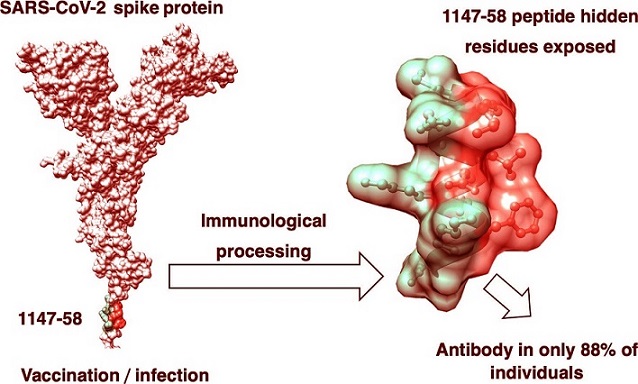Twelve Percent of Vaccinated Individuals Lack Key COVID-19 Antibodies, Raising New Concerns
Nikhil Prasad Fact checked by:Thailand Medical News Team May 07, 2025 9 months, 1 week, 44 minutes ago
Medical News: Uncover a Surprising Gap in Post-Vaccine Immunity
A new international study has revealed a startling finding—about 12 percent of individuals who received two doses of a COVID-19 vaccine show no detectable antibodies to a specific and highly conserved part of the SARS-CoV-2 spike protein. This crucial segment, known as the 1147-58 region, plays a potentially important role in long-term immune responses and vaccine effectiveness.
 Twelve Percent of Vaccinated Individuals Lack Key COVID-19 Antibodies, Raising New Concerns
Twelve Percent of Vaccinated Individuals Lack Key COVID-19 Antibodies, Raising New Concerns
The study was conducted by researchers from the Department of Transfusion Medicine at Tata Medical Center in India, the Russian Academy of Sciences, the Institute of Bioorganic Chemistry in Russia, and the Auckland University of Technology in New Zealand. Their research explored how blood transfusion services could assist in monitoring vaccine responses at the population level, using a novel red cell–based testing method called kodecytes.
A New Method of Immune Surveillance
The scientists tested 315 Indian blood donors who had received two doses of the Covishield™ vaccine, manufactured by the Serum Institute of India. All donors reported no known history of COVID-19 infection and were screened using both a standard SARS-CoV-2 antibody test (CLIA) and the kodecyte-based method that specifically targets the 1147-58 region of the spike protein.
While the CLIA test showed that all 315 individuals had antibodies to the general spike protein (with 98.7 percent showing immune-level titers), the kodecyte test revealed a more nuanced story. According to this
Medical News report, only 63.2 percent of the samples had moderate to strong responses to the 1147-58 region, 24.8 percent had weak responses, and 12.1 percent had no detectable response at all.
This region of the spike protein is known to be partly hidden within the structure of the virus, only becoming fully exposed after the virus or the spike protein from the vaccine has been broken down. Therefore, a lack of antibodies targeting this specific region could indicate that the body either failed to mount a comprehensive immune response or that the breakdown and processing of the vaccine material did not occur as expected in some individuals.
Implications for Long-Term Protection
The 1147-58 segment is considered a "conserved" region of the spike protein—meaning it remains largely unchanged even as the virus mutates. Antibodies targeting such regions may be important not just for immediate defense, but for protection against future variants. This makes the absence of these antibodies in 12 percent of vaccinated individuals particularly noteworthy.
Interestingly, the findings mirror results from previous studies, such as one involving a three-peptide assay developed by Shrock et al., which also found that about 88 percent of vaccine recipients generated antibodies to certain conserved regions, leaving a similar 12 percent without that specific immun
e protection.
How Blood Banks Could Help in Pandemic Surveillance
The research also highlights the potential role of blood transfusion services in pandemic surveillance. Since blood donors regularly provide samples and represent a cross-section of the community, they offer an ideal population for monitoring vaccine-induced immunity, especially when using scalable and cost-effective technologies like kodecytes.
The kodecyte method, unlike conventional laboratory tests, attaches synthetic peptide fragments of the virus to red blood cells, which can then be used to detect specific antibodies via a widely used column agglutination technique in transfusion medicine.
No Significant Demographic Patterns Found
The study participants ranged in age from 18 to 65 years, with a median age of 33.5 years, and the majority (85.9 percent) were male. Statistical analysis showed no link between age, sex, or weight and the likelihood of having or lacking antibodies to the 1147-58 region.
Conclusions and Future Directions
This study sheds light on a critical blind spot in our current understanding of COVID-19 vaccine responses. While nearly all vaccinated individuals may show general antibodies to the spike protein, a notable minority do not generate antibodies to the conserved 1147-58 region. This could potentially affect how well their immune systems respond to future exposures or variants of the virus. Future research is needed to determine whether the absence of these antibodies has any clinical impact on reinfection risks, severity of disease, or vaccine durability.
The study findings were published in the peer reviewed journal: Transfusion Clinique et Biologique
https://www.sciencedirect.com/science/article/abs/pii/S1246782025000874
For the latest Vaccine News, keep on logging to Thailand
Medical News.
Read Also:
https://www.thailandmedical.news/news/spike-in-blood-protein-levels-after-inactivated-covid-19-vaccines-sparks-health-concerns
https://www.thailandmedical.news/news/doctors-warn-that-covid-19-vaccines-can-cause-very-late-onset-neuromyelitis-optica-spectrum-disorder-in-some
https://www.thailandmedical.news/news/covid-19-vaccine-causes-acquired-hemophilia-a-by-generating-autoantibodies-that-inhibit-coagulation-factors
https://www.thailandmedical.news/articles/vaccine-news
https://www.thailandmedical.news/pages/thailand_doctors_listings
